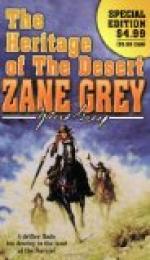When he had pulled on his boots and coat, and had washed himself in the runway of the spring, his hands were so numb with cold they refused to hold his comb and brush; and he presented himself at the roaring fire half-frozen, dishevelled, trembling, but cheerful. He would not tell Naab. If he had to die to-day, to-morrow or next week, he would lie down under a cedar and die; he could not whine about it to this man.
“Up with the sun!” was Naab’s greeting. His cheerfulness was as impelling as his splendid virility. Following the wave of his hand Hare saw the sun, a pale-pink globe through a misty blue, rising between the golden crags of the eastern wall.
Mescal had a shy “good-morning” for him, and Piute a broad smile, and familiar “how-do”; the peon slave, who had finished breakfast and was about to depart, moved his lips in friendly greeting that had no sound.
“Did you hear the coyotes last night?” inquired August. “No! Well, of all the choruses I ever heard. There must be a thousand on the bench. Jack, I wish I could spare the time to stay up here with you and shoot some. You’ll have practice with the rifle, but don’t neglect the Colt. Practice particularly the draw I taught you. Piute has a carbine, and he shoots at the coyotes, but who ever saw an Indian that could hit anything?”
“Damn—gun no good!” growled Piute, who evidently understood English pretty well. Naab laughed, and while Hare ate breakfast he talked of the sheep. The flock he had numbered three thousand. They were a goodly part of them Navajo stock: small, hardy sheep that could live on anything but cactus, and needed little water. This flock had grown from a small number to its present size in a few years. Being remarkably free from the diseases and pests which retard increase in low countries, the sheep had multiplied almost one for one for every year. But for the ravages of wild beasts Naab believed he could raise a flock of many thousands and in a brief time be rich in sheep alone. In the winter he drove them down into the oasis; the other seasons he herded them on the high ranges where the cattle could not climb. There was grass enough on this plateau for a million sheep. After the spring thaw in early March, occasional snows fell till the end of May, and frost hung on until early summer; then the July rains made the plateau a garden.
“Get the forty-four,” concluded Naab, “and we’ll go out and break it in.”
With the long rifle in the hollow of his arm Jack forgot that he was a sick man. When he came within gunshot of the flock the smell of sheep effectually smothered the keen, tasty odor of black sage and juniper. Sheep ranged everywhere under the low cedars. They browsed with noses in the frost, and from all around came the tinkle of tiny bells on the curly-horned rams, and an endless variety of bleats.




